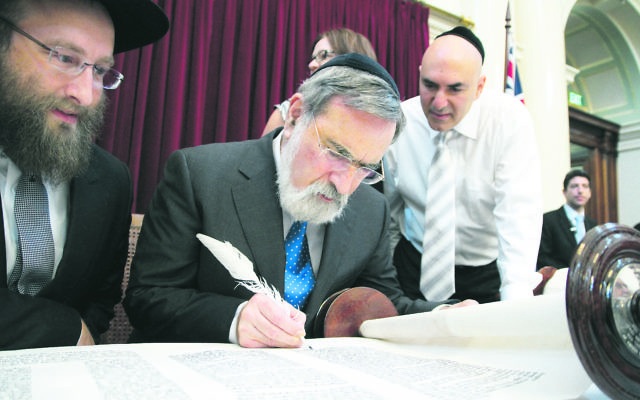Shul beats Facebook, declares Chief Rabbi
ENLIVENING an audience of more than 700 guests, including political, faith and Jewish communal leaders, Chief Rabbi Lord Jonathan Sacks crystallised the important role that synagogues play in modern Jewish life.
ENLIVENING an audience of more than 700 guests, including political, faith and Jewish communal leaders, Chief Rabbi Lord Jonathan Sacks crystallised the important role that synagogues play in modern Jewish life.
The gala fundraising dinner, at Palladium at Crown on Sunday night, in aid of urgent restorations at East Melbourne Hebrew Congregation (EMHC), capped off a momentous day for the inner-city shul, on the 155th anniversary of its foundation.
In the presence of Rabbi Sacks, who was visiting Melbourne on the last leg of his final official tour of Australia, two Sefer Torahs for EMHC were dedicated in a ceremony at State Parliament.
After the final letters were inscribed, the scrolls were taken in a colourful procession from Queen’s Hall, Parliament House, through the Parliament Gardens and along Albert Street to the nearby synagogue.
At the evening function, Pratt Foundation chief executive Sam Lipski, introducing Rabbi Sacks, welcomed guests, especially Alf ‘Uncle Boydy’ Turner, grandson of William Cooper, whose Aboriginal Advancement League led a lone protest against Kristallnacht to the German consulate in Melbourne in 1938.
The Chief Rabbi gave context to the Torah dedication by distilling the significance of synagogue worship. “Shuls give to us three things that I think are as central to human happiness now as they ever were.”
The first, he said was a genuine sense of “community” in the age of Facebook. Unlike some faiths, which extol solitude and emphasise the synthesis between individuals and their creator, Judaism, has been a faith of human togetherness. As early as Bereishit in the Book of Genesis, the Torah declared it was not good to be alone, he noted.
Rabbi Sacks emphasised the spiritual limitations of online social networking, noting a survey of young Facebook users, who had hundreds of internet “friends” but were lucky to have one or two real friends who could help them through a personal crisis. “Never let us believe that virtual relationships mediated by smartphone can substitute for the face-to-face friendships you have in shul.”
The second benefit of synagogue life, he said, was Shabbat, and the sense of real values it imparted.
He harked back to two days before the August 2008 stock market crash in Britain, when a sculpture resembling the biblical golden calf was offered for sale at Sotheby’s.
“We turn gold, which is a medium of exchange, into an object of worship. The boom … was caused by rising house prices … but the value of a house is that it is a home.” The commandment to keep Shabbat, so proximate to the one prohibiting the worship of idols, is significant,” he said. “Shabbat is the antidote to the golden calf, the day we celebrate the things that have value, not their price.”
The third tenet of shul involvement was “giving … what we’re willing to share with others”, which he described as a truer measure of individual worth than the acquisition of wealth. “Scientific research has shown it’s one of the most important components of a happy life.”
Prime Minister Julia Gillard, speaking on a pre-recorded video, welcomed Rabbi Sacks to Australia, describing him as a religious leader whose mission is to bring the world’s great faiths closer together in a spirit of mutual understanding.
EMHC’s Rabbi Dovid Gutnick described the national trust-protected synagogue as a drawcard for Jewish visitors, local congregants and the interfaith community. The EMHC board was further developing a conservation management plan initiated 10 years ago to enhance “a spiritual oasis in a big city”.
On Friday night, Rabbi Sacks was guest of honour at Melbourne Hebrew Congregation, where he addressed a congregation of several hundreds during a service celebrating sister congregation EMHC’s milestone, led by Rabbi David Rubinfeld.
Drawing on Sedra Bo, the Chief Rabbi related the anguish of Pharaoh’s advisers, and their inability to persuade their leader to let Moses lead his people out of Egypt.
PETER KOHN


comments